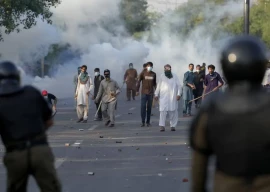
"The United States is firmly committed to providing the best defense technology possible to India. We are both leaders in technology development and we can do incredible work together," he said on a visit to the Indian capital.
New Delhi and Washington are close partners on defense issues with some $8 billion of arms sales under their belts, moving past decades of distrust, although the United States lost out on a major fighter jet deal this year after offering old technology.
"We must move beyond a focus on individual arms sales to regular cooperation that increases the quantity and quality of our defense trade," he said, adding that Washington was moving to reform export controls that have limited weapons transfers to India.
Panetta also called on New Delhi to modernise its defense procurement rules and nuclear liability legislation and said the Pentagon would work with Indian leaders to cut red tape and speed up defense sales.
"I think close partnership with America will be key to meeting India's own stated aims of a modern and effective defense force," he said.
The friendship between the world's two largest democracies is viewed with caution from Beijing, where some in government fear India is part of a US strategy to limit China's rise on the world stage. India is spending about $100 billion over 10 years on modernizing the military, in large part with an eye on China.
Panetta noted that India and the United States both see China as having "a critical role to play advancing security and prosperity in this region."
"The United States welcomes the rise of a strong, prosperous and a successful China that plays a greater role in global affairs - and respects and enforces the international norms that have governed this region for six decades," he said.
Panetta said India and the United States should conduct more regular and complex military exercises. His remarks in New Delhi came on the same day as Russian President Vladimir Putin said he will boost military exercises and cooperation with China.
Panetta is on week-long visit to Asia to spell out a new US defense strategy to allies and partners in the region. The strategy, which was released in January, calls for a shift in US strategic focus to the Asia-Pacific.
The Pentagon said in the security strategy that the United States was working to build on strategic ties with India, the only partner nation singled out by name in the document.
Panetta urged India's leaders to build on engagement with rival Pakistan and to "continue with additional support to Afghanistan through trade and investment, reconstruction, and help for Afghanistan's security forces."
But analysts note that New Delhi has a long history of non-alignment with the major powers and prefers to maintain its independence of action.
"I don't think that India is going to stand up and be counted right, a) because India's political time and attention is focused inwards, and b) because I don't think there is any clarity on how we position ourselves apropos the US-China relationship," said Indian defense analyst Uday Bhaskar.
India last year agreed to buy a fleet of C-17 transport planes and P-81 maritime surveillance jets from US company Boeing, as well as Lockheed Martin's Super Hercules.
It is at a late stage of talks to buy more than a dozen Boeing Apache attack helicopters and last month cleared the purchase of 145 M777 Howitzer artillery guns. Panetta though made no public mention of these deals while he was in India.
Last year India dropped Lockheed's F-16 from the bidding for a $10 billion purchase of 126 fighter jets, partly because European companies were offering more modern aircraft. Some in Washington considered India's decision to go with European planes a snub to US offers of a close defense alliance.
The Pentagon has subsequently offered to sell India the latest F-35 jets, a fifth generation multi-role stealth fighter which are still undergoing development.
COMMENTS (13)
Comments are moderated and generally will be posted if they are on-topic and not abusive.
For more information, please see our Comments FAQ













































India and the U.S. are not only business partners, they are soulmates. Both want to keep an eye on what's going on in Central Asia, which is the backyard of China and Russia and these two aren't natural allies of India and the U.S. Despite the lack of longterm interests in the region the U.S. wants to secure a peaceful endgame in Afghanistan in 2014. India has an agenda on its northern border and faces challenges in Afghanistan, while dealing with its historic foe Pakistan. Despite the BRICS-membership, China and India are wary of each other's ambition and Putin's visit in China this week has been watched closely in Delhi.
Security and prosperity of India is critical for Asia. If India goes down, whole of SE Asia goes with it.
That is the way the history was and that is the way the history will be. The rising risk of Asia is ideological terrorism which is disruptive for commerce.
Sticky issue between India and china on Tibet, China's tacit support of Maoists in Nepal and NE India and PAK meddling in Kashmir will all actually work in India's favor in world politics.
Before our life time : Tibet will get its autonomy with China blessing, PAK and India will integrate in commerce and India and Bangladesh will integrate in commerce and labor and Mayanmar and India will be connected in transit,.
Sri Lanka will move on with the flow, as PAK and PAK will pull AFG along with the inevitable growth in commerce.
Disruption : PAK- AFG conflict . Peace pipe: TAPI - Bangladesh pipeline plus Mayanmar pipeline .
From the commentators,I could feel that they're jealous that US is now favoring India rather than them....
But dont worry guys,India will never give up its sovereignty for the sake of being someone's ally.... Since its inception,India has maintained its relationship with USSR(now Russia),while forging new ties with China,Israel,Saudi Arabia and now USA....
Our Non Alignment Pact made sure that we're always on the neutral side....You may mockingly call us Banias.... But in current world,its best to do good business with everyone and not to poke nose in others wars....
@Nasir: Yes the old allied doubled crossed it and now they have to find a new baby who will also double cross it over time.
@Truth: 2 peace ambassadors? seriously ?
Cat is out of bag.....US wants big money to streamline is economy and who is better to lose purse string than India. Sadly we are falling into US trap at the cost of national integrity and prevailing poverty. US will arm India to teeth and once it becomes strong enough to flex its muscle like china, it will seek another ALLY to bully India. Irony is that we start gloating over the offer.
India wants what is best for India. The US wants what is best for the US. Where their requirements converge, there will be business opportunities - and large ones, given the size of the economies in discussion. India has more immediate concerns than becoming counter-weight to China or part of the US-led alliance in the region, and I am sure that strategists in the US understand that already. Everyone going hyper on this new axis of evil should take a deep breath and focus on problems closer to home.
I think the Word Peace is misinterpreted. When America use the word Peace then it does not mean Peace but in actual it means Piece. America wants Piece or infact pieces everywhere. Divide and conquer and destroy and let us Spread Piece. America wants a piece of Economy, Oil, Mineral and power everywhere in the world and he we go spreading peace?
New born kid of big daddy...
The Title says it all, two two biggest peace ambassadors together, peace through weapon business :)